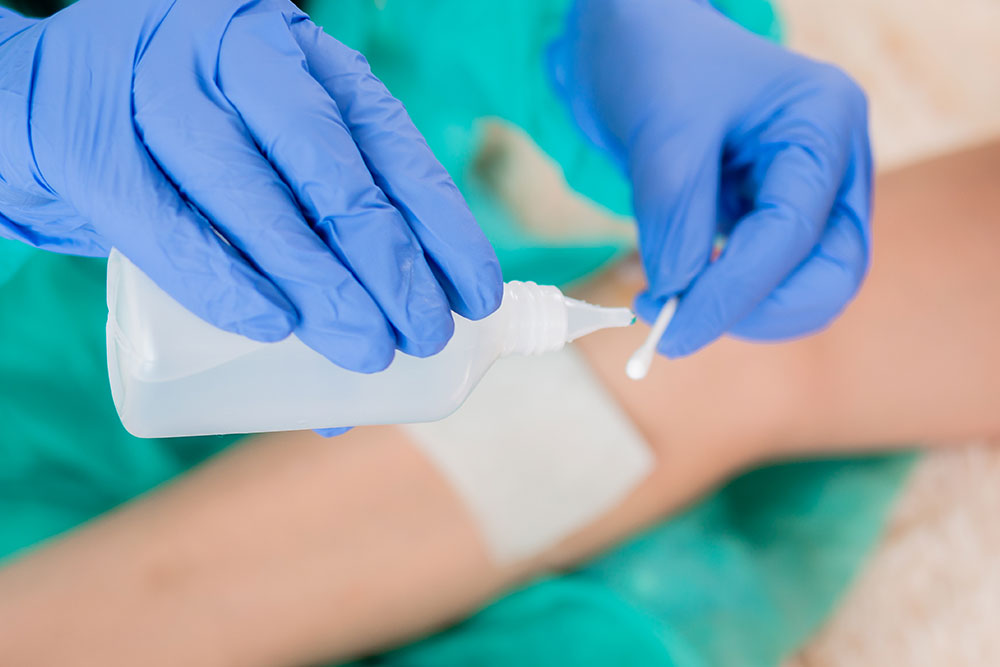Abrasions are superficial injuries on the skin that cause a break or opening in the surface of the skin. These are the simplest form of skin injuries and usually heal naturally. In most cases, abrasions heal without leaving a scar on the skin’s surface.
What are abrasions?
Abrasions are skin scrapes that involve the outer layer and sometimes the lower layers of the skin. Abrasions are commonly formed due to friction against the skin and can appear due to blunt traumas, friction, and impact.
According to the National Institute of Health (NIH), the head and torso regions are the most common sites for scrapes, consisting of 50% of all abrasions. This is followed by the lower limbs, which account for 35% of all abrasions. In kids, abrasions or scrapes are the most common form of injury accounting for 70% of all injuries.
Etiology
Abrasions are usually classified into three main types:
- Linear or scratch abrasions. Linear abrasions are commonly caused by nail scratches or other straight-line injuries. These abrasions are the simplest of all injuries and tend to heal on their own with time.
- Patterned abrasions. Patterned abrasions are typically caused by a right-angle force against the skin. This leaves an image of the item that caused the injury on the skin.
- Grazed or brush abrasions. Grazed or brush abrasions are caused when the skin is rubbed against a rough surface. These are commonly seen in cases of road traffic accidents as well as sports falls.
Pathophysiology
Abrasions range from a cut in the skin surface to damage to the deep-lying structures like nerves, muscles, tendons, or even bones. Abrasions result in a break in the surface of the skin. This injury releases signals to the body to begin the healing process. As a result, there may be bleeding, redness, and swelling. This is the body’s way of repairing the wound. In most cases, the body’s response is effective and requires no follow-up. Complications may require the intervention of a medical provider.
Complications
Infection is a common complication of abrasions. The risk of infection can be reduced if the wound or abrasion is cleaned immediately and appropriately. In some cases, a local antibiotic can be applied topically to prevent wound contamination. In cases of deep abrasions, systemic antibiotics may be prescribed.
Treatment
The first treatment for abrasions is to remove any foreign body or debris from the wound and clean it well. This will decrease the chance of skin infection. After this, an antibiotic ointment may be applied. After the ointment, a non-adherent dressing should be applied over the abrasion to help keep it clean.
The ointment and dressing application are to help keep the wound moist. This assists with the wound-healing process.
If the abrasion shows signs of infection like purulent discharge (pus) it may need special attention. This could range from cleaning the wound and prescribing antibiotics to surgical intervention to remove dead tissue in extreme cases.
Facial abrasions are more critical as they have a higher risk of scar formation and should be cleaned thoroughly and dressed daily. There are additional options for more advanced would treatment available for facial wounds available through your medical provider.
Facial abrasions are considered more serious in Denver as these have a higher risk of cicatrization and should be cleaned, debrided, and dressed daily. Dressings may require skin adhesives like the combination of gum mastic, styrax, alcohol, methyl salicylate, or tincture of benzoin. Facial abrasions and considered more serious as these have a higher risk of cicatrization and should be cleaned, debrided, and dressed daily. Dressings may require skin adhesives like the combination of gum mastic, styrax, alcohol, methyl salicylate, or tincture of benzoin.
Related Review
Got in fast. Had a great doctor! I liked that he was direct and told me what my next steps should be. I was extremely happy that he wasn’t quick to prescribe more pills just to continue to put a band aid on the problem. I was able to get the temporary relief that I needed and he gave me recommendations for long term solution. I was in and out in an hour.
-S J
Abrasions Treatment Cost in Denver
The total cost of Abrasions Treatment varies greatly depending on a variety of criteria. Price is dependent on factors such as medical examination fees and the type of injuries and treatments required. Please contact our office for more information.
Contact us
In case of urgent medical care assistance, AfterOurs Urgent Care in Denver offers immediate telemedicine services, where medical providers are available to offer assistance. Anyone who experiences signs and symptoms requiring urgent medical attention can simply book an appointment with AfterOurs Urgent Care to directly talk to an expert. If your medical issue is not appropriate for telemedicine, we will let you know and refer you to an in-person facility.
When to visit a doctor:
If you experience abrasion on any part of your body that is not healing properly, you should see a medical provider in order to avoid possible serious complications.
Treatment for abrasions is available at AfterOurs Urgent Care.
Related Blogs
Phytodermatitis: Treating Poison Ivy Rash This Summer
As the summer season approaches, outdoor enthusiasts and nature lovers eagerly await the opportunity to explore the great outdoors. With the joys of nature come potential risks, one of which is poison ivy, a common plant that can cause a painful and itchy skin rash...
Top 5 Most Common Urgent Care Conditions
Urgent care centers have become a popular option for people seeking medical attention for non-life-threatening conditions. These facilities provide prompt and efficient care without the hassle of long emergency room waits. Urgent care centers can handle a variety of...
Drug Combination to Alleviate Long COVID Symptoms
Brain fog has been found to be one of the most common symptoms experienced by long COVID patients. Brain fog is an umbrella term that includes a range of symptoms, including memory problems, confusion, reduced concentration, mental fatigue, and other cognitive...

